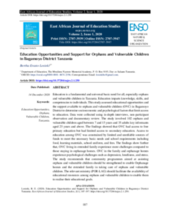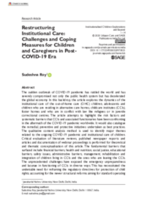Displaying 161 - 170 of 1465
This study assessed educational opportunities and the support available to orphans and vulnerable children (OVC) in Bagamoyo District to determine socioeconomic and psychological factors that limit access to education.
This article explores the dynamics of the institutional care of the out-of-home care (OHC) children, adolescents and children who are residing in alternative care homes, childcare institutes (CCIs), foster homes and who are in conflict with law like refugees or in juvenile correctional centres.
This study examined the self-reports of youth in Israeli residential care settings designed for youth from underprivileged backgrounds on the extent of perceived availability of support from their siblings among other sources of support, and the contribution of sibling support to various positive and negative measures of well-being and functioning.
This chapter will record the views of a small sample of elders (now in their 70s, 80s and 90s), who grew up in Barnardo’s facilities in the UK, on being separated from their siblings and how they re-connected with their brothers and sisters in old age.
This article provides an ethnographic and cross-sectional study of the management of orphanages in one Nigerian city.
By drawing on the experiences of parents, advocates, NGOs, and public officials, this side event invited discussion on how, through strengthening families and tools for prevention, societies can reduce the number of children being institutionalized. During the event, a panel of experts from the Republic of Moldova, South Africa, Burkina Faso, Vietnam, and the United States explored their experiences around efforts to empower parents and keep children with disabilities with their families.
Disability Rights International, Validity Foundation, and the European Network for Independent Living, Youth Network Board hosted a webinar on children with disabilities in adversity as part of the Conference of States Parties to the UN Convention on the Rights of Persons with Disabilities.
In response to the need for accurate and reliable statistics on children in residential care, UNICEF has developed the first-ever comprehensive methodology to collect data on children living in residential care settings by applying a number of preexisting tools from international survey programmes, such as the Multiple Indicator Cluster Surveys (MICS) and other validated instruments, to an institutional population.
This video is a recording of the virtual launch of the data collection protocol on children in residential care, held by UNICEF on 3 December 2020.
The purpose of this study was to test the feasibility of an intervention created to stimulate the development of children under the age of seven, living in an institution for children without parental care in Bosnia and Herzegovina. The aim of the intervention was to match each child with one volunteer, trained to deliver three hours per week of individually tailored, play-based activities, for a minimum of one year.


